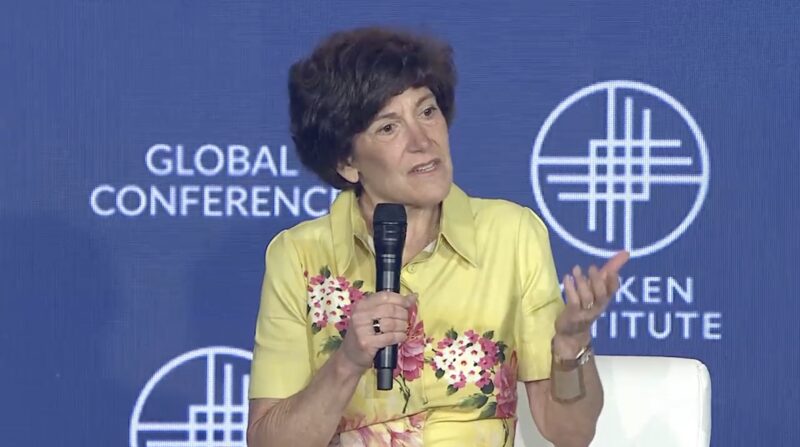High risk, high social return
Laura Lauder hails impact investment, venture philanthropy at Milken conference
Citing Jewish values, head of Lauder Family Fund calls for billions sitting in donor-advised funds to go to risky but rewarding initiatives

Screen capture/Milken Institute
Laura Lauders speaks on stage at the Milken Institute Global Conference in Beverly Hills, Calif., on May 1, 2023.
Laura Lauder called for the tens of billions of dollars “sitting in cash” in donor-advised funds in the United States to be used for socially constructive impact investments, saying this represents “the biggest opportunity for philanthropy in America,” during an onstage panel at the Milken Institute Global Conference on Monday in Beverly Hills, Calif.
“In the philanthropic space in the United States, we have over $250 billion sitting in donor-advised funds,” said Lauder, who leads the Laura and Gary Lauder Family Venture Philanthropy Fund and is on the boards of several Jewish organizations.
“Of the $250 billion, almost a third of it is sitting in cash. People are thinking that they’re going to give it away tomorrow and then they don’t, and it sits in these donor-advised funds for years and years,” she said. “Let’s use the collaborative research that we have identified for fantastic opportunities to put these funds into social impact pools.”
For the past 30 years, Lauder and her husband Gary, the grandson of cosmetics mogul Estée Lauder, have run Lauder Partners, a Silicon Valley venture fund. Lauder said her time in Silicon Valley has made her “extraordinarily risk tolerant,” but also focused on establishing clear criteria and exit strategies in her family’s philanthropy.
As examples of the types of opportunities that the cash sitting in donor-advised funds could go toward, Lauder offered “high-risk and yet high social return” initiatives like income sharing agreements, in which a person agrees to set aside a portion of their future income in exchange for funding to learn new skills, or “environmental projects or housing projects.”
Addressing a session on “Strategic Philanthropy Around the World,” Lauder said she was shifting her focus away from the “pure philanthropy” of donating money with no expectation of return in favor of venture philanthropy, which focuses primarily on impact but also includes concessionary returns.
“That is an area where you can really scale philanthropy because you’re looking to do loans, you’re looking to do impact investments. And that way you can grow and scale much more,” she said.
“[These] returns can often be not just return of capital, but also concessionary, typically single digits. And that way you can really scale, because you can recycle the dollars. I have found that by promoting venture philanthropy and social impact investing, you absolutely get the best of both worlds,” Lauder continued.
This call advanced a position on impact investment that she expressed last year, alongside her husband, in an opinion piece for eJewishPhilanthropy.
In her remarks on Monday, Lauder noted both her immediate family’s dedication to philanthropy, as well as the broader Lauder family’s efforts, both of which she said were drawn from their Jewish faith and the ideas of “zedakah and the importance of righteous giving, the idea that we as families must give back.”
“This is a commandment, a mitzvah. As a result, tikkun olam, which means to repair the world, is very much a part of the Jewish faith and what we are passionate about doing. And my husband Gary, who’s here, and I are very, very intent on carrying this on, this legacy to our children. And we learned it very much from my father-in-law Leonard Lauder, who has been extraordinarily generous in his 90 years,” she said.
Lauder noted that the entire Lauder family recently announced a $200 million donation to the Alzheimer’s Drug Discovery Foundation to find better ways to diagnose and treat the disease.
Calling it a “moonshot level” of venture philanthropy, Lauder said the family hoped that this money would enable “research to try to find drugs that can mitigate the situation, as well as discover ways to diagnose Alzheimer’s disease much earlier, and therefore have drugs to prevent the worsening of Alzheimer’s disease.”
She added that Bill Gates and Jeff Bezos have also donated to this cause, specifically toward the diagnostic efforts.
“For us, that is a family commitment and we’re really excited about it,” she said.












